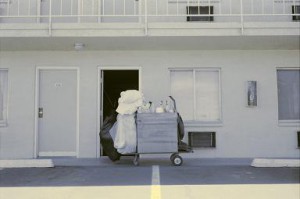 Bed bugs have become almost epidemic in some areas of the U.S., and even high-end hotels and lodges have found the little critters in their rooms. Bed bugs are easy to transport and can live up to a year without eating, so they can become a problem quickly. As South Carolina criminal defense attorneys, we travel frequently and have found that the following tips to avoid bed bugs have been helpful.
Bed bugs have become almost epidemic in some areas of the U.S., and even high-end hotels and lodges have found the little critters in their rooms. Bed bugs are easy to transport and can live up to a year without eating, so they can become a problem quickly. As South Carolina criminal defense attorneys, we travel frequently and have found that the following tips to avoid bed bugs have been helpful.
Know what bed bugs are and what they look like.
Bed bugs feed on blood at night and disappear during the day. Their bites leave red marks or welts, which often appear in a row on your arms or legs. The Cornell University Cooperative Extension has created a card to take with you when you travel to show you what bed bugs look like and how to inspect your hotel room.
Research the hotels or motels you plan to stay in.
The Bedbug Registry at http://bedbugregistry.com/ is a database of bed bug reports from around the U.S. and Canada. Google the name of each hotel or motel with the words “bedbug” and “bed bug” to see if anyone has reported them. You can also check with sites such as tripadvisor.com and hotels.com to see if there are any negative reviews related to bed bugs.
Call and talk to the desk clerk.
Most reputable hotels and motels are keenly aware of the problem and proactively spray regularly. If you call and the desk clerk seems evasive or doesn’t want to talk about their bed bug control plan, find another place to stay.
Inspect your room before you bring luggage in.
Get out a flashlight and look for blood spots, bugs, shed skins, or feces (which look like pepper) in corners, cracks, and crevices near the bed. Search around the headboard and the mattress, especially near stitching and seams. Check the bed frame, bed ruffles, and where the sheets tuck in. See if the sheets, pillows, or pillowcases have old blood spots. Open the drawers of bedside tables, and check upholstered furniture, behind pictures, and inside drapes.
If you do find evidence of bed bugs, ask for another room, but do not accept one that is adjacent to the infested room. You’ll need to repeat the inspection in the new room.
Keep your luggage and possessions away from possible infestation.
If your room passes inspection, do not assume all is well. There could be a recent infestation from the guest before you. Do not put anything on the bed or on the bedside table. Always keep your luggage and bags (including purses) on racks away from the wall, on tables with metal legs, or in the tub. Buy some plastic bags that seal to put your bedclothes in, and do not add them to your regular luggage.
After you get home . . .
While just one pregnant female can start an infestation in your Folly Beach, Ladson, or St. George home, the good news is that bed bugs cannot live in very high or very low temperatures. When you return home, leave your suitcases outside, and wash and dry all your clothing (plus purses and bags if possible) on the highest temperature settings possible to kill any hitchhikers. If you cannot wash or dry something, put it in the freezer for at least three weeks.
Do you have any additional tips to avoid bed bugs?
 All too often, people arrive at motor vehicle hearings unprepared, when a little homework and knowledge would make all the difference in the outcome. The Office of Motor Vehicle Hearings (OMVH) is meant to be an objective and fair meeting place to hear your case, but you need to know what you’re doing before you go.
All too often, people arrive at motor vehicle hearings unprepared, when a little homework and knowledge would make all the difference in the outcome. The Office of Motor Vehicle Hearings (OMVH) is meant to be an objective and fair meeting place to hear your case, but you need to know what you’re doing before you go.
First, be sure to thoroughly study all the documentation you receive from the OMVH, so you know what’s going on and what you’ll need to do. Many people skip this and later wish they hadn’t. If you have to go through a hearing, you want to win, and understanding the documentation is the first step in that direction.
A Hearing Officer will be assigned to your case, and if you need to contact his or her assistant, that information will be in the brochure you receive. You cannot speak with the Hearing Officer directly unless the other parties to the case are present. The assistant will help you with scheduling and answer procedural questions, but no one in the OMVH can offer legal advice.
Second, decide whether you want an attorney to represent you. You can represent yourself (pro se) or retain an attorney—no one else can argue your case at the hearing. As South Carolina auto accident attorneys, of course we recommend you protect your rights by hiring legal counsel, but only you can make that decision.
Your case documentation will include deadlines you must meet. If you need to file any kind of motion or response, it must be done in writing and mailed or hand-delivered. If you use the mail, we recommend that you send it registered or certified so you have proof of receipt. Your docket number must appear on everything, and anything you send to the OMVH must go to every party in your case.
If you and the parties to your case settle the matter out of court, or you wish to withdraw your request for a hearing, notify the Hearing Officer immediately by phone or in writing. Otherwise, your hearing will proceed much like a trial, with opening and closing statements, presentation of evidence, and examination of witnesses.
If you have requested the hearing, you have the burden of proof. Be sure you have credible witnesses and documentation proving your side of the case. Anything you submit into evidence becomes the property of the OMVH. You have the right to subpoena witnesses, but you must arrange and pay for it. Always present yourself as professionally as possible, and stick to the facts of the case.
The Hearing Officer issues a written decision as soon as possible, but no guidelines govern decision timelines. If you wish to appeal a decision, you may do so within 30 days after you receive the decision, and an Administrative Law Judge will hear the appeal.
For more information, click here to download the Office of Motor Vehicle Hearings guide.

